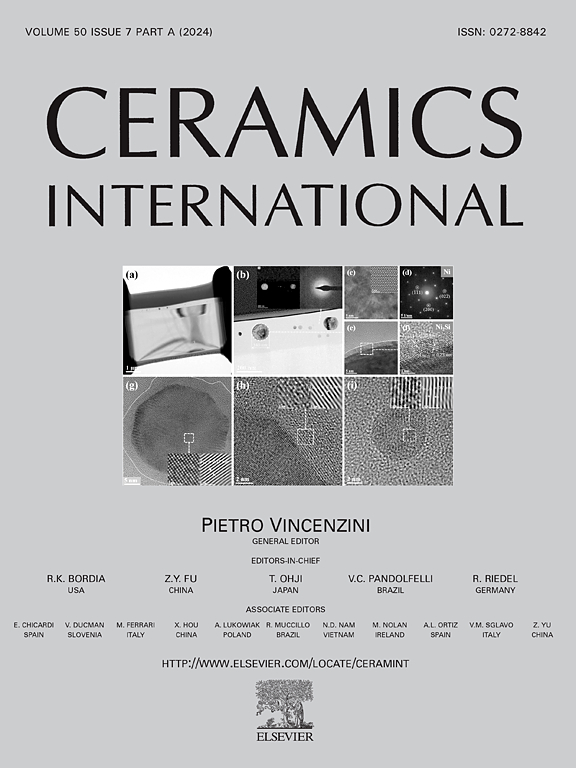基于 SiO2-CaO-Na2O-P2O5 季化合物体系的熔融衍生 BG 的物理力学性能、羟基磷灰石转化率、生物降解性和抗菌活性研究
IF 5.1
2区 材料科学
Q1 MATERIALS SCIENCE, CERAMICS
引用次数: 0
摘要
硅酸盐基生物活性玻璃(BGs)的生物降解速度慢、羟基磷灰石(HA)转化率低,严重限制了它们与生物组织的相容性。为了解决这些难题,我们采用统一的熔淬法制备了四种 (52-x)SiO2-24Na2O-24CaO-xP2O5 形式的样品(其中 x 为 2、4、6 和 8 摩尔%),并评估了 P2O5 含量微调在改善玻璃结构、生物降解性、生物活性和抗菌效率方面的可行性。结果表明,随着 P2O5 替代程度的增加,玻璃的网络结构变得松散,这为玻璃的降解提供了有利条件。Si4+ 离子释放的活化能从 0.39 eV 到 0.25 eV 的变化也证实了这一观点。在模拟体液(SBF)中浸泡 7 天后,能量色散光谱(EDS)、X 射线衍射(XRD)和傅立叶变换红外(FTIR)分析证实,玻璃表面沉积的 Ca-P 化合物基本上是羟基碳化磷灰石(HCA),扫描电子显微镜(SEM)图像显示,HCA 的生成率与玻璃体系中的 P2O5 含量呈正相关。同时,抗菌研究表明,经过 24 小时的培养后,四种玻璃样品对大肠杆菌的抗菌活性依次提高,最高达到 87.13 ± 2.51%。总之,这项研究表明,通过调节硅酸盐基生物玻璃中的 P2O5 含量,可以实现可控降解和高水平的生物活性,这被证明是一种有效而实用的策略。本文章由计算机程序翻译,如有差异,请以英文原文为准。
Physico-mechanical properties, hydroxyapatite conversion, biodegradability and antibacterial activity studies of melt-derived BGs based on SiO2-CaO-Na2O-P2O5 quaternary system
The slow biodegradation and low hydroxyapatite (HA) conversion of silicate-based bioactive glasses (BGs) have severely limited their compatibility with biological tissues. To address these challenges, four samples in the form of (52-x)SiO2-24Na2O-24CaO-xP2O5, where x is 2, 4, 6, and 8 mol%, were prepared by a unified melt-quenching method, and the feasibility of P2O5 content fine-tuning in improving glass structure, biodegradability, bioactivity, and antibacterial efficiency was evaluated. The results indicated that as the degree of P2O5 substitution increased, the network structure of the glass became looser, which provided favourable conditions for its degradation. The variation in activation energy for Si4+ ion release from 0.39 eV to 0.25 eV also supported this observation. After 7 days of immersion in simulated body fluid (SBF), analyses by energy dispersive spectroscopy (EDS), X-ray diffraction (XRD) and Fourier transform infrared (FTIR) confirmed that the Ca-P compounds deposited on the glass surfaces were essentially hydroxycarbonated apatite (HCA), and scanning electron microscopy (SEM) images revealed that the generation rate of the HCA were positively correlated with the P2O5 content in the glass system. Meanwhile, antibacterial studies showed that after 24 h of incubation, the antibacterial activity of the four glass samples against Escherichia coli (E. coli) successively increased, with the highest percentage reaching 87.13 ± 2.51 %. In conclusion, this study demonstrates that controllable degradation and high-level bioactivity can be achieved by modulating the P2O5 content in silicate-based BGs, which proves to be an effective and practicable strategy.
求助全文
通过发布文献求助,成功后即可免费获取论文全文。
去求助
来源期刊

Ceramics International
工程技术-材料科学:硅酸盐
CiteScore
9.40
自引率
15.40%
发文量
4558
审稿时长
25 days
期刊介绍:
Ceramics International covers the science of advanced ceramic materials. The journal encourages contributions that demonstrate how an understanding of the basic chemical and physical phenomena may direct materials design and stimulate ideas for new or improved processing techniques, in order to obtain materials with desired structural features and properties.
Ceramics International covers oxide and non-oxide ceramics, functional glasses, glass ceramics, amorphous inorganic non-metallic materials (and their combinations with metal and organic materials), in the form of particulates, dense or porous bodies, thin/thick films and laminated, graded and composite structures. Process related topics such as ceramic-ceramic joints or joining ceramics with dissimilar materials, as well as surface finishing and conditioning are also covered. Besides traditional processing techniques, manufacturing routes of interest include innovative procedures benefiting from externally applied stresses, electromagnetic fields and energetic beams, as well as top-down and self-assembly nanotechnology approaches. In addition, the journal welcomes submissions on bio-inspired and bio-enabled materials designs, experimentally validated multi scale modelling and simulation for materials design, and the use of the most advanced chemical and physical characterization techniques of structure, properties and behaviour.
Technologically relevant low-dimensional systems are a particular focus of Ceramics International. These include 0, 1 and 2-D nanomaterials (also covering CNTs, graphene and related materials, and diamond-like carbons), their nanocomposites, as well as nano-hybrids and hierarchical multifunctional nanostructures that might integrate molecular, biological and electronic components.
 求助内容:
求助内容: 应助结果提醒方式:
应助结果提醒方式:


